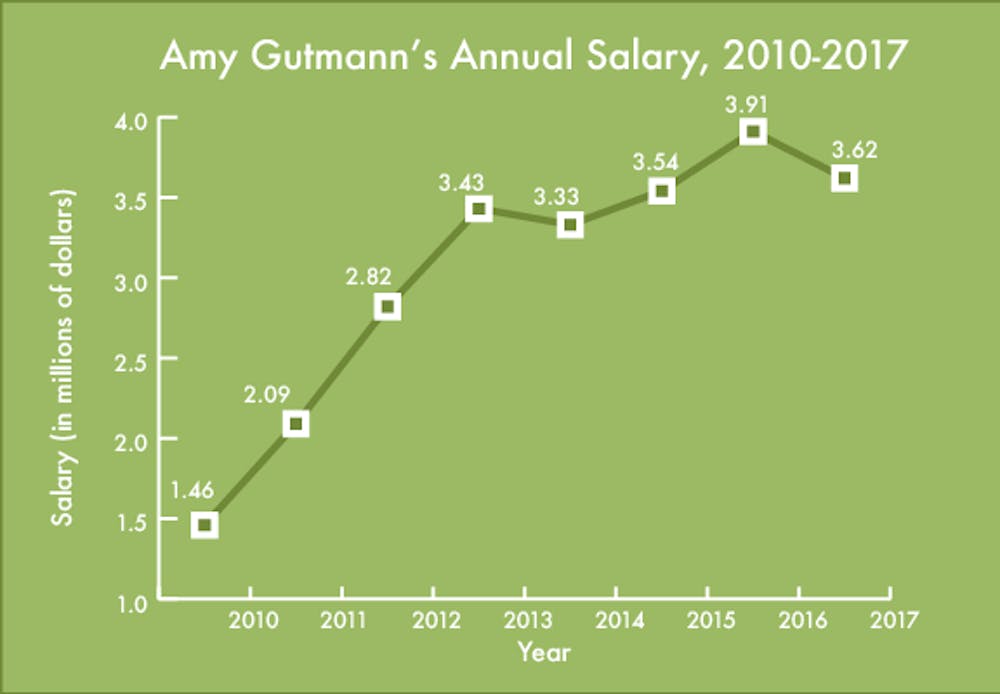
Penn President Amy Gutmann was paid $3.6 million in 2017, an 8% decrease from 2016.
Gutmann’s salary in 2016 was reported at $3.9 million, according to last year's report Penn filed with the Internal Revenue Service. Gutmann remains one of the highest-paid university presidents in the nation. Since 2010, Gutmann's salary has followed an upward trend, with a slight decrease in 2014.
Penn Board of Trustees Chair David Cohen said Gutmann's high salary points to her high performance, which includes fundraising and strengthening the applicant pool.
Gutmann is now the fourth-highest paid private university president in the nation and the highest-paid president in the Ivy League, according to The Chronicle for Higher Education. The Chronicle's report does not include retirement and other deferred compensation in its calculation. Gutmann's salary recently became available with the Internal Revenue Service's release of the University's Form 990 for the 2018 fiscal year, the most recent report on her salary.
Cohen attributed the decrease in Gutmann's salary to a one time incentive payment which she received in 2016 and not in 2017.
"She certainly deserves to be among the very highest paid college and university presidents in the country," Cohen said.
In 2016, Gutmann was the third-highest paid private university president and the second-highest paid president in the Ivy League, behind Columbia University President Lee C. Bollinger.
Cohen said that Gutmann's salary is set each year by a compensation committee comprised of himself and three other trustees. Gutmann’s salary includes nontaxable benefits and compensations including the base pay at approximately $1.4 million, bonus and incentive pay at approximately $1.2 million, retirement and other deferred compensations, according to the Internal Revenue Service report.
At the end of each year, Cohen said that the president writes a self-evaluation on whether she had reached her goals set at the beginning of the year. The president's performance against these objectives is then used to determine her salary, Cohen said.
In 2017, Cohen said he worked with Gutmann to set "very aggressive targets," which included fundraising, innovation, improving student and faculty diversity, and faculty recruitment.
Cohen said that Gutmann's major accomplishments in 2017 included recruiting a new dean of the Stuart Weitzman School of Design, strengthening the applicant pool to create a record-low acceptance rate, and increasing diversity among students and faculty.
"President Gutmann is an extraordinary leader at Penn," Cohen said. "We think her performance was outstanding in 2017 as measured against the goals we identified."
Cohen said the compensation committee also considers the salaries of peer institutions' presidents, particularly those at other Ivy League institutions, when deciding Gutmann's salary.
The Associated Press reported that the average pay for America’s private university presidents increased by 10.5% in 2017.
Gabriel Serna, an expert in higher education, said this increase could be explained by universities' hopes to hold onto high performing presidents.
"If she is good at her job and she is in high demand, then the University is going to be at odds with the market," Serna said. "It might be a mechanism for keeping her in place and keeping that talent at the University if goals are being met."
The Daily Pennsylvanian is an independent, student-run newspaper. Please consider making a donation to support the coverage that shapes the University. Your generosity ensures a future of strong journalism at Penn.
Donate






